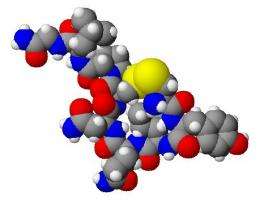May 19, 2017 report
Study finds new complexities in the neurochemistry of socializing

(Medical Xpress)—The number and quality of social relationships is now considered to be a particularly strong marker for health, well-being, longevity and sexual reproductive fitness. However, most research into the neurobiology of sociality focuses on a narrow set of peptides and relationships—often the hormone oxytocin, which is generally placed into the context of reproductive relationships.
A new study by researchers at Aalto University and the University of Oxford takes sharp aim at the limited scope of such studies, noting that the overemphasis on oxytocin tends to mask the social importance of dopamine and endorphins. They have published the results of their study in the Proceedings of the National Academy of Sciences.
The researchers collected genetic data from 757 people who also completed self-report questionnaires on mobile devices. The surveys included the EQ scale and the Experiences of Close Relationships Scale.
After analyzing the results, the researchers mapped the variations of 33 single nucleotide polymorphisms (SNPs, or "snips") for the receptor genes of six neuropeptides across three domains of sociality: social disposition, dyadic relationships and social networks. The six neuropeptides were serotonin, dopamine, oxytocin, vasopressin, endorphins and testosterone. The results demonstrate that three neuropeptides—β-endorphin, oxytocin and dopamine—were particularly important, each associated predominantly with a different social domain.
Summarizing some of the findings, the researchers noted these strong associations:
- Testosterone and β-endorphin were strongly associated with disposition.
- Oxytocin and dopamine were strongly associated with dyadic relationships.
- β-endorphin was found to influence dyadic relationships, though to a lesser degree.
- Dopamine and serotonin had the strongest associations with wider social networks.
This was the first study to map many of these correlations. One notable finding was that oxytocin, generally stereotyped as a hormone related to pair bonding, also had effects on establishing wider social networks. Dopamine's well-known association with the pleasure response may also explain its apparent effects in pleasure-based activities conducted among networks of friends, such as dancing, singing and celebrating. "To our knowledge, dopamine function has never been studied in relation to social interaction beyond the dyad, with past research showing links only to romantic relationships or parenting," the authors write.
Past studies of β-endorphin have focused primarily on social pain caused by rejection due to its well-known effects in the pain system. The authors write, "It is becoming increasingly clear that β-endorphin is also involved in the creation and maintenance of social relationships."
While not a definitive study of neuropeptide effects of social engagement, the study does provide enough details to suggest that the neurochemistry of sociality is deeper and more complex than previous studies have demonstrated. "In sum," the researchers write, "two important conclusions emerge: (i) most neuropeptides are associated with one particular social domain, and (ii) only endorphin and dopamine are widely active across all three domains."
More information: Variation in the β-endorphin, oxytocin, and dopamine receptor genes is associated with different dimensions of human sociality. PNAS May 1, 2017, DOI: 10.1073/pnas.1700712114
Abstract
There is growing evidence that the number and quality of social relationships have substantial impacts on health, well-being, and longevity, and, at least in animals, on reproductive fitness. Although it is widely recognized that these outcomes are mediated by a number of neuropeptides, the roles these play remain debated. We suggest that an overemphasis on one neuropeptide (oxytocin), combined with a failure to distinguish between different social domains, has obscured the complexity involved. We use variation in 33 SNPs for the receptor genes for six well-known social neuropeptides in relation to three separate domains of sociality (social disposition, dyadic relationships, and social networks) to show that three neuropeptides (β-endorphin, oxytocin, and dopamine) play particularly important roles, with each being associated predominantly with a different social domain. However, endorphins and dopamine have a much wider compass than oxytocin (whose effects are confined to romantic/reproductive relationships and often do not survive control for other neuropeptides). In contrast, vasopressin, serotonin, and testosterone play only limited roles.
© 2017 Medical Xpress




















